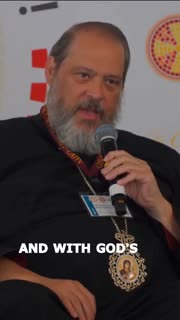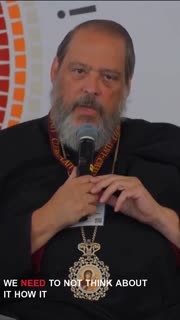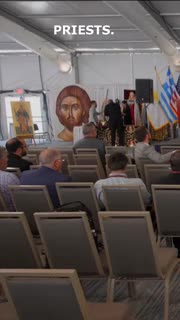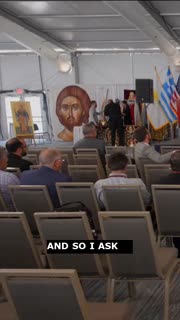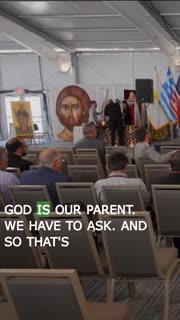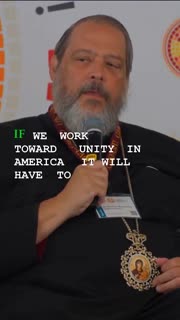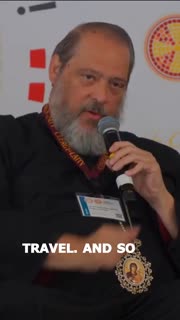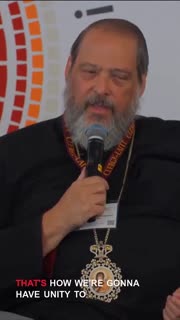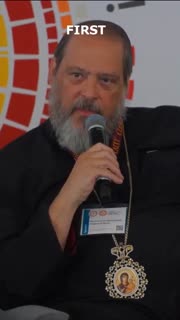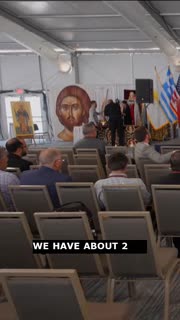Unity and Future of the Orthodox Church in America
Devotional
Sermon Summary
Bible Study Guide
Sermon Clips
### Quotes for outreach
1. "And with God's grace and his extended hand, we can accomplish all kinds of things because God is with us. And so do your work and we will be extremely happy. And whatever we can do, I know I speak for all of them, whatever we can do to help you, ask." [31:35] (27 seconds)
2. "We need to not think about it how it impacts me and how it impacts you and you and you we need to look and see how it impacts our people and set it up so that one day we can be a unified church. That's what we need to do." [41:40] (17 seconds)
3. "We need priests. When they show that affinity, encourage them to come to whatever seminary is drawing them. We will need them. And if we don't get on our hands and our knees and pray to God to help us, we are going to be sorely in trouble." [01:21:49] (23 seconds)
4. "And so I ask you again, please pray for vocations because we are going to need them. And a few of those vocations will replace me when I'm dead. But we're going to need priests. And so please, I beg of you, pray to God to help us. And he will." [01:22:33] (24 seconds)
5. "God is our parent. We have to ask. And so that's what I ask you to do for all of us and for all of our sakes. Thank you." [01:23:12] (9 seconds)
### Quotes for members
1. "If we work toward unity in America it will have to come I believe from both directions I believe from the bottom up and from the top down but most of it will be from the bottom up and there's reasons why I say that because in our local communities my brother priests of the different jurisdictions hopefully are working together meeting together maybe once a month for a meal if you're not you're you're missing out and you need to organize the lay people of your communities to do things together." [30:09] (42 seconds)
2. "And so when they show up, help them so they can help you. I don't know if I answered your question, but I think I'm out of time. I mentioned in my first sort of answer some of the things that we should be doing at the local level. And I think the ultimate goal of the assembly, at least it was originally, not only for our assembly, but for all assemblies around the world, was to move toward unity." [32:33] (314 seconds)
3. "That's how we're gonna have unity to move together as hierarchs and with the people toward a specific goal and to start taking those strides step by step. That's how we'll have unity in my eyes. I'm gonna be dead. I'm not gonna be here but I believe in Bishop Andres generation and Maxine's generation and Nicholas's generation in their lifetime will be there or at least close." [43:01] (33 seconds)
4. "The first map for Unity came from a seminarian. Not from a hierarch, from a seminarian. A lay person. That's what I mean, it will come from the bottom up. That's an example." [51:18] (16 seconds)
5. "We have about 2,100 parishes, as Father George mentioned. We are having a loss of about 115 priests every year, either dying or retiring. And our seminaries are putting out somewhere between 30 and 35 priests. That's a lapse of about 80 per year, which means in five years, we're going to be short 400 priests, which means we're going to have 400 parishes without a priest. That's a real loss. That's a real problem in front of us." [01:21:05] (36 seconds)
Ask a question about this sermon
1. "And with God's grace and his extended hand, we can accomplish all kinds of things because God is with us. And so do your work and we will be extremely happy. And whatever we can do, I know I speak for all of them, whatever we can do to help you, ask." [31:35] (27 seconds)
2. "We need to not think about it how it impacts me and how it impacts you and you and you we need to look and see how it impacts our people and set it up so that one day we can be a unified church. That's what we need to do." [41:40] (17 seconds)
3. "We need priests. When they show that affinity, encourage them to come to whatever seminary is drawing them. We will need them. And if we don't get on our hands and our knees and pray to God to help us, we are going to be sorely in trouble." [01:21:49] (23 seconds)
4. "And so I ask you again, please pray for vocations because we are going to need them. And a few of those vocations will replace me when I'm dead. But we're going to need priests. And so please, I beg of you, pray to God to help us. And he will." [01:22:33] (24 seconds)
5. "God is our parent. We have to ask. And so that's what I ask you to do for all of us and for all of our sakes. Thank you." [01:23:12] (9 seconds)
### Quotes for members
1. "If we work toward unity in America it will have to come I believe from both directions I believe from the bottom up and from the top down but most of it will be from the bottom up and there's reasons why I say that because in our local communities my brother priests of the different jurisdictions hopefully are working together meeting together maybe once a month for a meal if you're not you're you're missing out and you need to organize the lay people of your communities to do things together." [30:09] (42 seconds)
2. "And so when they show up, help them so they can help you. I don't know if I answered your question, but I think I'm out of time. I mentioned in my first sort of answer some of the things that we should be doing at the local level. And I think the ultimate goal of the assembly, at least it was originally, not only for our assembly, but for all assemblies around the world, was to move toward unity." [32:33] (314 seconds)
3. "That's how we're gonna have unity to move together as hierarchs and with the people toward a specific goal and to start taking those strides step by step. That's how we'll have unity in my eyes. I'm gonna be dead. I'm not gonna be here but I believe in Bishop Andres generation and Maxine's generation and Nicholas's generation in their lifetime will be there or at least close." [43:01] (33 seconds)
4. "The first map for Unity came from a seminarian. Not from a hierarch, from a seminarian. A lay person. That's what I mean, it will come from the bottom up. That's an example." [51:18] (16 seconds)
5. "We have about 2,100 parishes, as Father George mentioned. We are having a loss of about 115 priests every year, either dying or retiring. And our seminaries are putting out somewhere between 30 and 35 priests. That's a lapse of about 80 per year, which means in five years, we're going to be short 400 priests, which means we're going to have 400 parishes without a priest. That's a real loss. That's a real problem in front of us." [01:21:05] (36 seconds)
